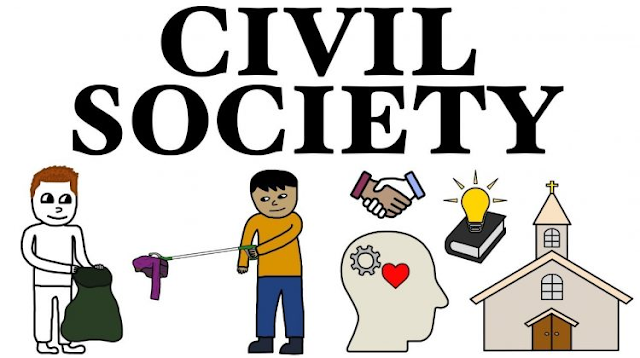What is Civil Society and their Functions and Challenges
Civil society are based on a
dynamic and complex realm of social organization. It includes a wide range of
non-governmental organizations, community projects, advocacy groups, and
grassroots movements that all work together to shape social and political life.
I.
Historical Roots of Civil Society:
What is Civil Society and their Functions and Challenges-The concept of civil society has
deep historical roots, evolving over time in response to changing political,
social, and economic contexts.
A. Ancient and Medieval
Foundations:
Greek Philosophical Thought: In
medieval Europe, guilds and associations emerged as structures of civil society
that provided a framework for tradesmen and artisans to collaborate, support
one another, and pursue shared interests.
Medieval Guilds and Associations: Guilds
and associations developed as forms of civil society in medieval Europe,
offering a framework for cooperation, assistance to one another, and the
pursuit of common interests among traders and artisans.
B. Enlightenment and Associational
Life:
Voluntary Associations: Guilds and
associations developed as civil society institutions in medieval Europe, giving
craftsmen and artisans a framework for cooperation, mutual support, and the
pursuit of common goals.
Tocqueville's Analysis: Alexis de
Tocqueville, in his work "Democracy in America," highlighted the
vitality of civil society in the United States, emphasizing the role of
voluntary associations in fostering a sense of civic responsibility.
II.
Conceptual Underpinnings of Civil Society:
Civil society is a complex and
evolving concept, shaped by various theoretical perspectives that highlight its
distinct features and functions.
A. Associational Life and
Intermediary Institutions:
Associational Democracy: Scholars
like Robert Putnam emphasize the significance of civic associations in
cultivating social capital and fostering a vibrant democracy. Voluntary
organizations, clubs, and networks contribute to the building of trust and
social cohesion.
Intermediary Institutions: Civil
society acts as intermediary institutions between the state and the individual,
providing a space where citizens can articulate their interests, voice
concerns, and participate in shaping public policies.
B. Sphere of Public Participation:
Habermasian Perspective: Jurgen
Habermas, in his theory of communicative action, underscores the role of civil
society as a sphere for rational discourse and public deliberation. It is seen
as a space where individuals engage in reasoned dialogue to reach consensus on
societal issues.
Deliberative Democracy: The concept
of deliberative democracy emphasizes the importance of civil society in
providing forums for informed and inclusive discussions, ensuring that diverse
voices are heard in the decision-making process.
III.
Functions of Civil Society:
Civil society performs a myriad of
functions that contribute to the well-being of societies, democratic
governance, and the pursuit of social justice.
A. Advocacy and Representation:
Policy Advocacy: Civil society
organizations often engage in policy advocacy, representing the interests and
concerns of specific groups or the broader public. This includes lobbying for
legislative changes, promoting social justice, and addressing human rights
issues.
Watchdog Role: Civil society acts
as a watchdog, scrutinizing government actions and holding institutions
accountable. This oversight function is crucial for maintaining transparency
and preventing abuses of power.
B. Social Service Provision:
Community Development: Civil
society organizations play a vital role in community development, providing
social services, educational programs, healthcare initiatives, and other
resources to address local needs.
Humanitarian Aid: In times of
crisis, civil society organizations often take the lead in providing
humanitarian aid, disaster relief, and support to vulnerable populations. Their
agility and grassroots connections enable swift responses to emerging
challenges.
C. Social Innovation and Change:
Innovative Solutions: Civil society
is a breeding ground for social innovation, as it allows for experimentation
with new ideas, approaches, and solutions to societal problems. This dynamism
contributes to the adaptability and resilience of societies.
Catalyzing Social Change: Social
movements and advocacy groups within civil society have historically played
pivotal roles in driving social change. Issues like civil rights, environmental
justice, and gender equality have seen significant advancements due to the
efforts of civil society actors.
IV.
Challenges Facing Civil Society:
While civil society is a powerful
force for positive change, it is not immune to challenges that can impede its
effectiveness and impact.
A. State Repression and
Authoritarianism:
Restrictions on Freedom of
Association: In authoritarian regimes, governments may impose restrictions on
the formation and activities of civil society organizations, limiting their
ability to advocate for change or challenge existing power structures.
Censorship and Suppression: Civil
society actors, including activists and human rights defenders, often face
censorship, harassment, and persecution for their work, particularly when
challenging repressive regimes.
B. Funding and Sustainability:
Dependence on External Funding:
Civil society organizations may face challenges related to financial
sustainability, as many rely on external funding sources. Dependence on donor
funding can compromise autonomy and limit the ability to address local
priorities.
Resource Inequality: Smaller or
grassroots organizations may struggle with resource inequality, lacking the
financial means and organizational capacity to compete with larger,
well-established counterparts.
C. Polarization and Fragmentation:
Fragmentation of Causes: The
proliferation of diverse causes within civil society can lead to fragmentation,
with various groups pursuing separate agendas. This fragmentation may dilute
collective impact and hinder coordinated efforts.
Polarization: In some contexts,
civil society may become polarized along ideological, political, or identity
lines. This polarization can weaken collaborative efforts and undermine the
inclusive nature of civil society.
V.
Contemporary Relevance of Civil Society:
In the 21st century, civil society
remains a critical force in shaping societies and influencing the trajectory of
global governance.
A. Digital Activism and
Connectivity:
Digital Platforms: The advent of
digital communication technologies has transformed how civil society operates.
Online platforms enable rapid mobilization, information dissemination, and the
organization of large-scale movements.
Global Connectivity: Civil society
organizations can now connect globally, fostering collaboration and the
exchange of ideas across borders. Digital activism has played a significant
role in amplifying voices and advocating for global causes.
BUY PDF & Book
WhatsApp - 8130208920
B. Responding to Global Challenges:
Climate Change and Environmental
Activism: Civil society is at the forefront of addressing global challenges
such as climate change. Environmental activism, led by civil society
organizations, amplifies the urgency of sustainable practices and policy
changes.
Humanitarian Crises: Civil society
responses to humanitarian crises, including refugee movements and global health
emergencies, underscore the agility and adaptability of these organizations in
providing support and advocacy.
Conclusion
Civil society, with its rich historical
roots, diverse functions, and contemporary relevance, stands as a cornerstone
of democratic governance and social progress. Its ability to advocate for human
rights, foster social innovation, and drive positive change is integral to the
health and vibrancy of societies worldwide.
What is Civil Society and their Functions and Challenges-As civil society continues to
navigate challenges, including state repression, financial constraints, and
polarization, it remains a resilient force capable of adapting to new
realities. The digital age has brought both opportunities and challenges,
transforming how civil society operates and amplifying its potential impact on
global issues.








0 comments:
Note: Only a member of this blog may post a comment.